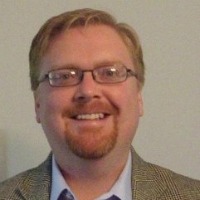
This post was written by Josh Hogan, who received a DLF HBCU Fellowship to attend the 2018 Forum.
Josh Hogan is the Assistant Head of the Digital Services Department at the Atlanta University Center Robert W. Woodruff Library. His primary responsibilities include taking a leadership role in a variety of digital curation activities, including digitization, metadata creation, repository management, and digital preservation.
Prior to assuming this role, he was the Metadata & Digital Resources Librarian at AUC Woodruff Library and spent several years as a manuscript archivist at the Atlanta History Center. Josh is strongly interested in digital scholarship/humanities research as well as the potential uses of open source software in digital preservation workflows.
“This neat separation, keeping your nose to the professional grindstone and leaving politics to your left-over moments, assumes that your profession is not inherently political. It is neutral. Teachers are objective and unbiased. Textbooks are eclectic and fair. The historian is even-handed and factual. The archivist keeps records, a scrupulously neutral job.” –Howard Zinn
In reflecting on my first experience at the DLF Forum, I am sure I’m not the first or only person to liken the experience to drinking from a fire hose. The many and varied experiences I had while in Las Vegas could fill several reflection pieces and would, perhaps, make for disjointed reading for those not living in my brain. After giving it some thought, I decided that the most important facet of my experience was finding an organization to which I could wholeheartedly and enthusiastically contribute.
I’ve chosen the quote above from Howard Zinn as an illustration of what I mean. As information professionals – librarians, archivists, etc.—we are often encouraged to make neutrality a central tenet of our ethical lives. I am not so sure that that approach is very healthy for us as well-rounded human beings. I have no beef with objectivity, i.e., a willingness to base our conclusions on the facts or evidence as those are presented to us, but I agree with Zinn that standing by neutrally only perpetuates the status quo. In other words, you can’t really be neutral on a moving train. I say all of this because I believe that the community encouraged by DLF is one that doesn’t demand a limp neutrality but an informed engagement.
This was evident across many of the sessions I attended, from Anasuya Sengupta’s excellent and thought-provoking plenary, “Decolonizing Knowledge, Decolonizing the Internet,” to the many engaging and important sessions put together by the Labor Working Group members. The work of DLF’s practitioners is grounded in reality and facts, but it is also engaged passionately with the issues and concerns of the broader communities that we serve.
The work of DLF’s practitioners is grounded in reality and facts, but it is also engaged passionately with the issues and concerns of the broader communities that we serve.
As part of my experience, I had an opportunity to serve as a moderator to a couple of excellent sessions. The first was a session organized by the Labor Working Group on “Organizing for Change, Organizing for Power” to address ways to change one’s workplace, community, etc. for the better. The presenters were so well organized that I had only to be there as a backup and was able to participate in the discussion. I also (lightly) moderated a powerful session on Citizen Scholarship which aimed to “discuss how we are building communities, supporting engaged pedagogies, and transforming institutional cultures through collaborative and situated knowledge-making work.” These activities both inspire me and remind me why I wanted to pursue work as a librarian/archivist in the first place.
Finally, attending DLF gave me a great opportunity to get plugged into the emerging Digital Scholarship Working Group, formerly known as the “Miracle Workers.” I was struck by the diversity of backgrounds and interests of people working on Digital Humanities and Digital Scholarship issues, and I am excited to contribute to their activities as the group grows.
In short, being a Fellow was an excellent experience that introduced me to an organization I really believe in. I plan to be a contributor for years to come.
Want to know more about the DLF Forum Fellowship Program? Check out last year’s call for applications.
If you’d like to get involved with the scholarship committee for the 2019 Forum (October 13-16, 2019 in Tampa, FL), sign up to join the Planning Committee now! More information about 2019 fellowships will be posted in late spring.
